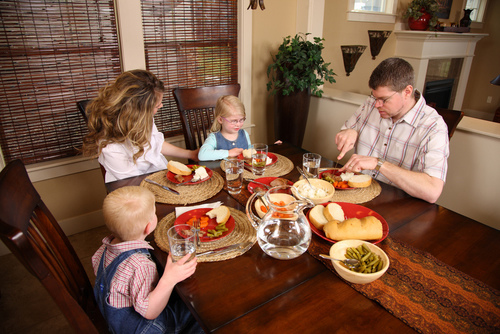By McKayla Skinner
When it comes to good health many Pediatricians will include family meals as part of their triage. This is not solely in honor of the maxim “Families who eat together, stay together,” rather it is built upon research findings that suggests that if a family eats at least 3 or more meals a week together they are more likely to achieve a healthy weight gain, avoid eating disorders, and have a healthy diet. Although there may be hurdles that families need to overcome, the following are a few suggestions that may help your family have a more enjoyable meal.
Keep it Family Style
Defined, Family Style is when “the food is placed on the table in serving dishes from which those eating may help themselves.” This prevents the constant up and down pre-plating and sometimes over-plating that is often left to the parents of young children. Or the food focused buffet style that sometimes leaves out the conversation. When implementing Family Style meals it is recommended that families with young children include them by making sure that they have “child-sized utensils, such as tongs and serving spoons,…smaller serving bowls, and pitchers to help them be successful passing and handling the food.” It is posited that this enables children not only to increase the variety of foods they will try, but it also helps children understand their own satiety.
Keep a Togetherness Perspective
Even with challenges, a family meal can bring the family together and create a sense of harmony in the home. For example, children and adults with sensitivity to phenylalanine (PKU, an amino acid found in food), must track all amounts of their food. Yet, despite this challenge, they affirm that “family meals are as important for PKU families as for any other family – maybe even more so, since mealtime provides not only an important opportunity for education about the diet, but it also reinforces that idea that food differences do not deter family togetherness.” That togetherness was recently noticed by a mother who refused to give up on family dinners, “If I didn’t insist we eat every night as a family, there’s a good chance we could go all day without the entire family in one place. We’d be less likely to check in on each other if we didn’t sit down each night and talk.” Likewise, families with unique food differences can affirm the benefits of family meals as it, “improves academic performance, reduces risky behavior, promotes physical wellbeing, stabilizes emotions, and eventually enhances your family relationship[s].” All these are benefits can come from an enjoyable meal and extend to the rest of your interactions as a family.
Keep it Memorable
Positive interactions during mealtimes can extend to others who visit with your family. An example of this come from two families who have been getting together every Sunday for the past 30 years. The couples became friends through their children, and both have since gone through many family transitions, including the loss of a child. At first the couples’ dinners started out as an experiment, to “share a family meal every week, with each taking turns as host.” It wasn’t a weekly invitation but rather an expectation, and the “ritual became known as Family Dinner.”
Their rules:
- The meal would be nice.
- They would hold hands and say grace before eating.
- The cooks would clean up, letting the “guest” family relax.
The couples learned that being intentional not only helped them cope with the challenges of life, but it also gave a sense of security to their posterity as they showed commitment to their own families and to their friendships.
Indeed, intentional family dinners focused on togetherness and family setting can produce a sense of security, wellbeing, and healthier lives.

